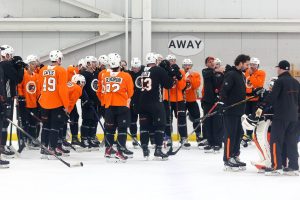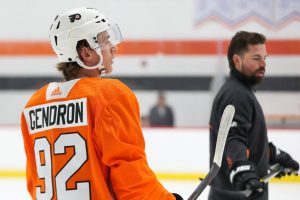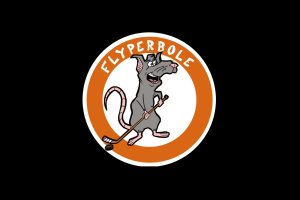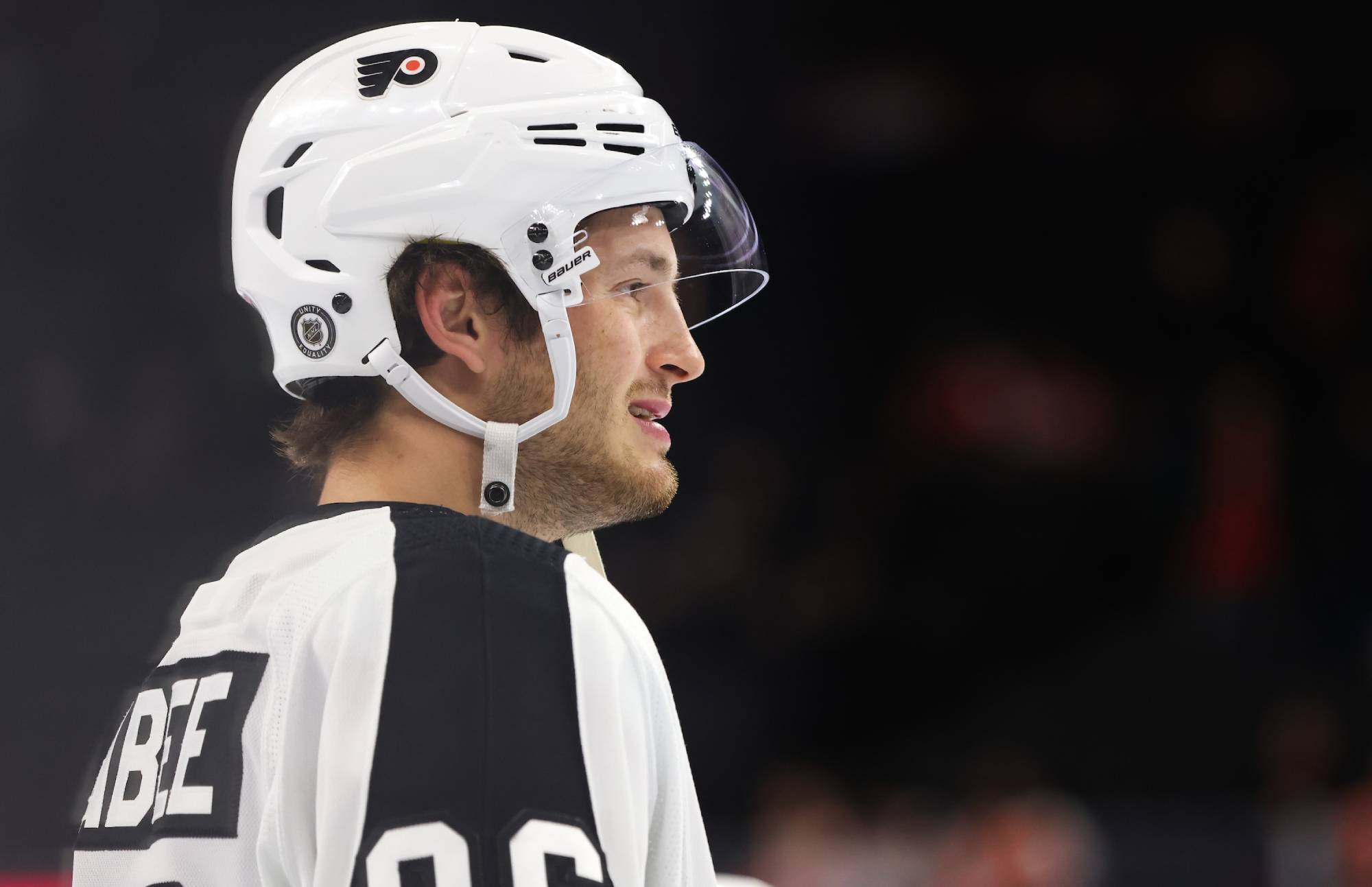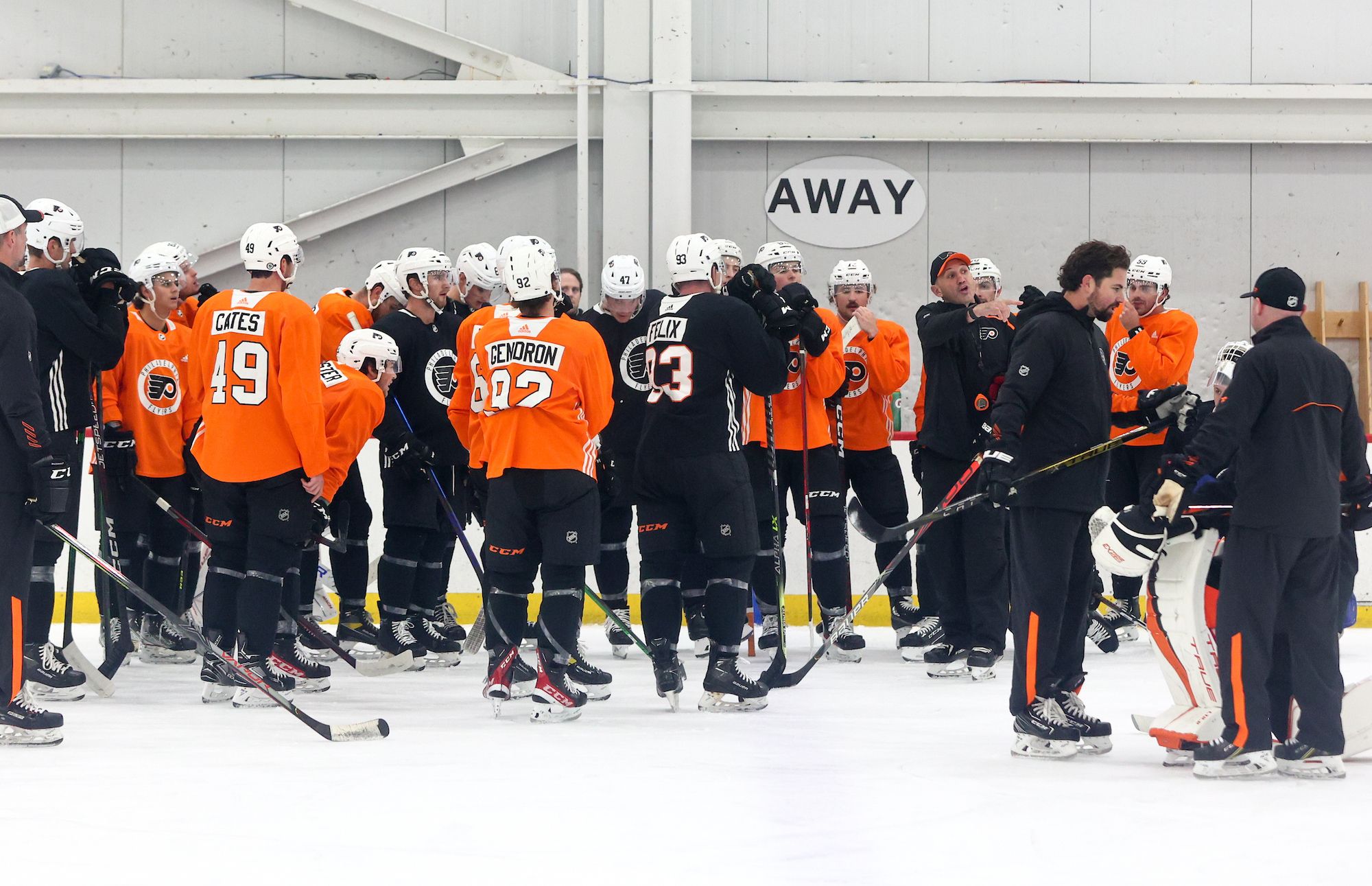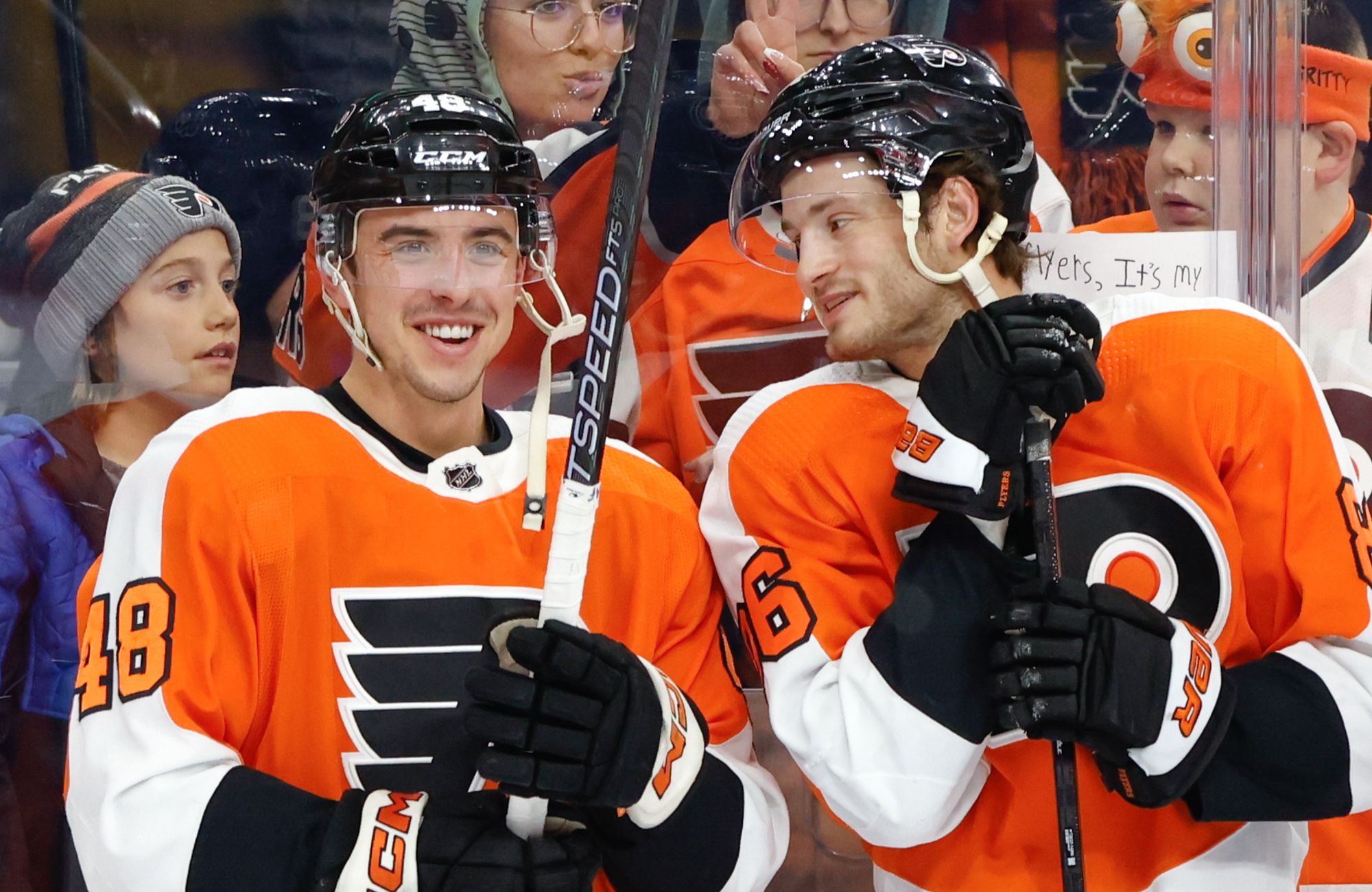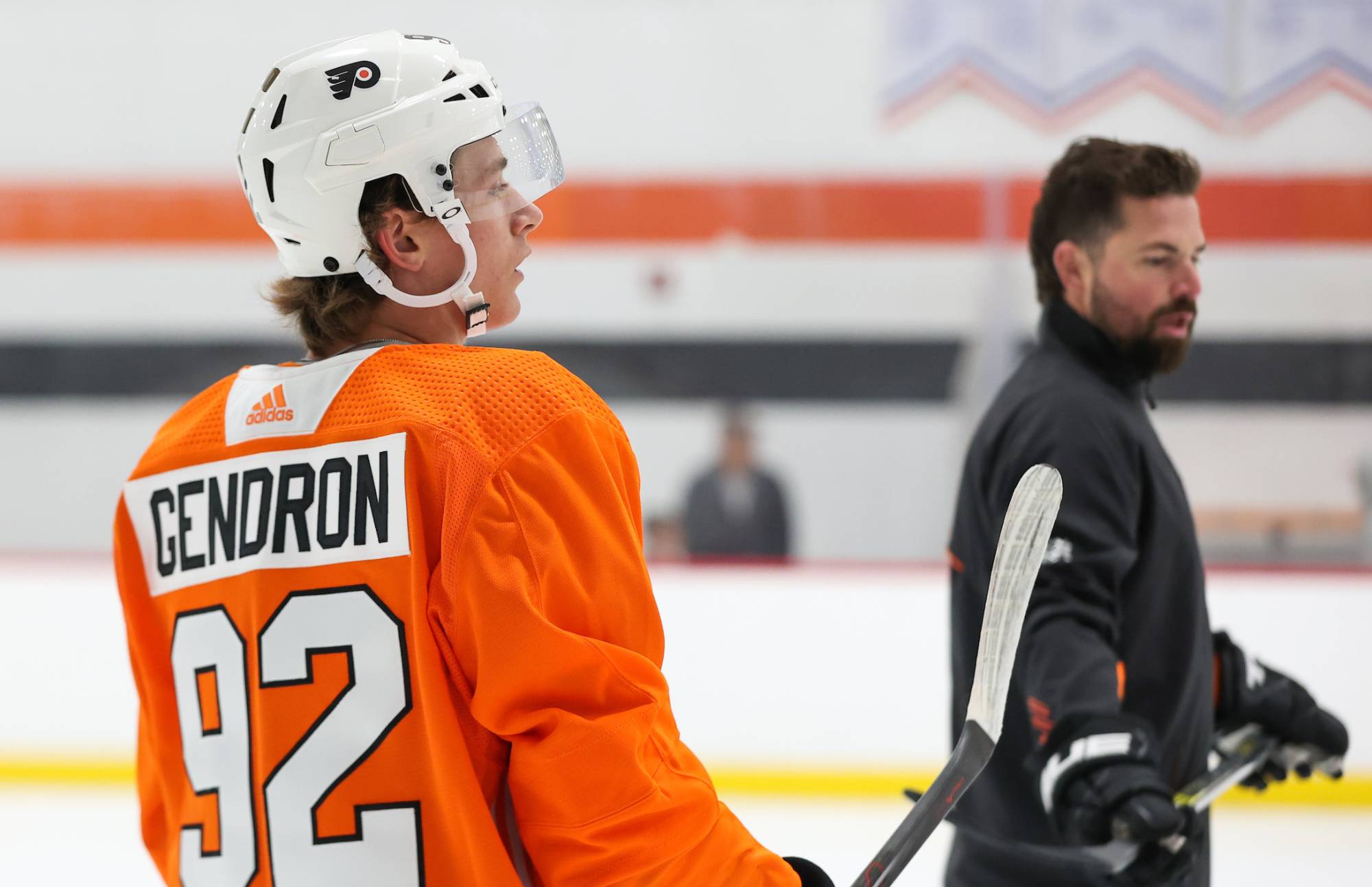A sometimes-frequent look back at how the Philadelphia Flyers have fared on this day, recalling some of the more memorable moments, achievements, and events that shaped the organization throughout the club’s storied history
The Flyers have an evenly-divided 3-3 mark in six playoff contests that took place on May 20, winning one time and dropping two decisions in games on this day that took overtime to decide.
Some of the more memorable moments and brief recaps in Flyers history that took place on May 20:
1975: Rene Robert’s bad angle shot made its way through a thickening, surreal blanket of fog and Flyers netminder Bernie Parent to give the Sabres a come-from-behind 5-4 victory in Game 3 of the Stanley Cup Final at Buffalo’s Memorial Auditorium, cutting Philadelphia’s Stanley Cup Final series lead to 2-1.
Already fresh off two victories in Philly, the Flyers jumped out to a 2-0 lead on goals from Gary Dornhoefer and Don Saleski just over three minutes after the opening faceoff. But the Sabres had one of the most explosive offensive attacks in the league, and they used a pair of quick strikes from Danny Gare and Rick Martin within a 17-second span to knot the game later in the frame.
Sabres’ centerman Jim Lorentz swatted a bat out of the air that had been flying overhead just prior to a faceoff, killing it instantly and dropping it onto the ice surface. Rick MacLeish scooped the deceased up in his glove and promptly deposited it in the Flyers’ penalty box.
That wasn’t the end of MacLeish’s contributions, however, as he beat Gerry Desjardins with a long shot a little over two minutes after Martin’s tally to give Philadelphia a 3-2 lead.
It was apparent the Buffalo netminder was fighting the puck, and he asked to be replaced at the intermission. Head coach Floyd Smith granted his wish by bringing in 33-year-old Roger Crozier to start the second.
It was an unseasonably warm day in the Buffalo-area and with temperatures reaching upwards of 90 degrees at the playing surface in the non-air conditioned old Aud, a fog rose off of the ice, making it difficult for the players to see center ice from their own goal line. The referee periodically had the players skate in circles during stoppages — even going as far as having rink workers join in on a couple of occasions, holding white bed sheets — in an attempt to get the fog to lift.
Don Luce and Reggie Leach traded second period goals to make it 4-3 Philly heading into the third, before defenseman Bill Hajt tied it up midway through the frame to send the eerie contest into overtime.
With the game knotted at 4-4 in extra time, Buffalo’s French Connection line would come up with the decisive sequence. With visibility worsening at ice level, Gilbert Perreault sent a long shot that Parent didn’t see. The puck sailed wide of the net and went into the right wing corner boards, where Robert gathered it up and fired a quick shot from the goal line that somehow found its way between the surprised goaltender’s pads and into the net.
“I saw Robert’s shot too late for me to come out and stop it. I’m surprised the overtime took so long. It was hard to see the puck from the red line. If three men came down and one made a good pass from the red line, you couldn’t see the puck. A good shot from the red line could have won it.” — Parent after the Game 3 loss
1987: Jari Kurri beat Ron Hextall 6:50 into overtime to give the Edmonton Oilers a 3-2 triumph at Northlands Coliseum, and a 2-0 lead in the Stanley Cup Final series.
Leading 2-1 on the strength of goals by Derrick Smith and Brian Propp after two periods of play, Edmonton turned up their offensive attack and swarmed Hextall in the third.
They outshot the Flyers 15-5 in the frame and finally knotted it up on a Glenn Anderson tally midway through the stanza, and in all reality it was only due to several miraculous stops from the combative goalie that the contest wasn’t over during regulation time.
Philadelphia actually had a great chance to win it in the extra session, but Propp’s bid for his second of the game beat Grant Fuhr but not the goal post as it harmlessly stayed out and deflected away just minutes before Kurri’s winning marker.
1997: Trent Klatt snapped a 3-3 deadlock late in regulation and Eric Lindros netted his first postseason hat trick as the Flyers downed the New York Rangers 6-3 at Madison Square Garden, as Philly wrestled back the home ice advantage they had lost two days earlier and took a 2-1 Eastern Conference Final series lead over the Broadway Blue Shirts.
Philadelphia took a 2-0 lead on first period markers from Lindros and Petr Svoboda, both of which had a measure of controversy to them. Lindros’ had to go to a video review, in which it was confirmed that the captain’s shot had indeed crossed the goal line.
Svoboda’s came after Rangers’ goalkeeper Mike Richter lost his stick, which appeared to be cleared further away from him by Dainius Zubrus prior to Svoboda’s goal being scored. Though Richter was livid — and with good reason to be incensed — the officials did not detect Zubrus’ infraction, and the goal stood.
The lead held up until the third period, but it would prove to be a wild final twenty minutes.
Russ Courtnall got the home squad on the board within the first minute of the frame while N.Y. was skating with a man advantage courtesy of a late-second period high-sticking double-minor to defenseman Michel Petit, and the Garden faithful — which had been uncharacteristically quiet with Philly holding a two-goal lead — was suddenly its usual raucous self again.
Rod Brind’Amour scored a power play goal and appeared to restore the two-goal lead, but it was waived off because John LeClair had been ruled to be in the New York crease.
It turned out to be a huge momentum swing when Courtnall beat Ron Hextall a second time in the stanza, tying the contest at 2-2 at 4:02 of the third.
A Lindros slap shot gave the Flyers a lead again just over two minutes later, but Wayne Gretzky — left all alone in front of the Flyers’ goal — was the recipient of a Mark Messier feed after jumbled communication between Hextall and defenseman Janne Niinamaa evened it up at 3-3 with just 5:39 remaining.
But the Rangers coughed up a two-on-one 38 seconds later, and Klatt put home a Shjon Podein feed for the game-winner. Brind’Amour sealed the deal less than two minutes later with one that couldn’t be disallowed, beating Richter with a gorgeous move on a breakaway, before Lindros hit the empty net at 19:22 to record the hat trick, his only one in the playoffs during his time with the Flyers.
2000: Craig Berube snapped a 1-1 tie with 7:02 remaining in regulation and Brian Boucher stopped 24 of 25 shots to lead the Flyers to a 3-1 triumph over the New Jersey Devils at Continental Airlines Arena.
Mark Recchi staked the visitors to a 1-0 lead before the first intermission, but Bobby Holik knotted the contest with a late-second period tally to send the clubs deadlocked into the final frame.
The tie lasted into the latter stages of the third, when Berube deflected defenseman Dan McGillis’ point shot past Martin Brodeur for the eventual game-winner. The goal was Berube’s first point of the 2000 postseason, and couldn’t have come at a better time.
Simon Gagne clinched the victory by putting a beautiful Eric Desjardins feed behind Brodeur to make it 3-1 and give Philly a 3-1 Eastern Conference Final series lead.
Boucher continued to hold down the fort in the Philly crease, leading the club to their second straight win in a building the Flyers had brandished an awful 4-22-2 record over the previous five years.
The rookie netminder made one of the great saves in franchise history on a Patrik Elias shorthanded breakaway in the previous Game 2:
and he had another memorable stop in Game 4, this one on a Scott Gomez shot in scary fashion as the puck lodged in the opening between the bars in his cage and came to rest just short of his eyes:
2004: The duo of Keith Primeau and Simon Gagne pulled the Flyers off the mat just when it appeared their season as about to be over. Primeau scored late in regulation to tie the score and Gagne won it in overtime in a 5-4 Eastern Conference Final series Game 6 thriller that forced a deciding Game 7 with the Lightning back in Tampa Bay.
After Vincent Lecavalier opened the scoring on a breakaway 1:28 into the contest, a backhander by Gagne and a Primeau one-timer off a Vladimir Malakhov feed forged a 2-1 lead for the home team by the first intermission.
After a Lecavalier slap shot just 45 ticks into the middle frame tied the score at 2-apiece, the versatile Sami Kapanen — who moved back to his familiar wing position after he had been forced to play on a Philadelphia blue line that was decimated by injuries for most of the series — took a pass from Alexei Zhamnov and blew a slap shot past Nikolai Khabibulin to restore the Flyers’ lead almost 12 minutes later.
But Tampa would not go lightly, and took the lead on a couple of similar-looking strikes from former-Flyer Ruslan Fedotenko, taking feeds from Dave Andreychuk in the slot and one-timing slappers past Robert Esche within a 2:18 span late in the stanza to give the Bolts a 4-3 lead heading into the third.
Though Philadelphia tilted the ice surface towards the Tampa cage for much of the third — they outshot Tampa, 17-5 in the period — Khabibulin was living up to his nickname of the “Bulin Wall” and appeared to have the answer for everything the Flyers threw at him.
That is, until Primeau’s dominant playoff run continued to reach legendary status in South Philly.
With the game clock winding down below two minutes remaining in regulation time, the captain crashed the crease to Khabibulin’s right and forced the puck through the goaltender to the other side of the net. Primeau skated around the back of the cage and jammed home the tying goal with 1:49 left to send the First Union Center crowd into an all-out frenzy.
Overtime held the same tempo, as Philly continued to get great scoring chances. As it seemed that multiple extra periods might be in the offing, the line of Gagne, Primeau, and Jeremy Roenick would come up with another batch of late-frame heroics.
Primeau’s initial shot was blocked by Lightning defender Pavel Kubina, and the puck went to Roenick, whose shot was stopped by Khabibulin. The rebound kicked out to Gagne at the right circle, and the Tampa netminder couldn’t get enough of his shot to keep it out of the net as it deflected off Khabibulin and into the net.
“The puck went right to my stick and I shot it as hard as I could.” — Gagne after the game of his first career postseason overtime marker
As for Primeau, his two goals and two assists in an elimination contest gave him nine goals, 16 points, and a +11 rating in 17 games during the club’s playoff run. Not bad for a player who had managed only nine total goals over the course of his first 110 postseason outings prior to 2004.
“It’s not just me, it’s everyone around me. I think our team showed a lot of courage the way we battled back.” — Primeau said after the game, attempting to deflect praise of his ongoing Conn Smythe-worthy performance that spring
May 20 Flyers Free Agent Signing
On this day in 2015 the Flyers took another step to revamping one of their problem spots that caused them to miss the playoffs in the previous campaign when they inked a mobile 32-year-old free agent, NHL-ready defender in Russian Yevgeni Medvedev, a blue liner who seems like a perfect fit for the new system head coach Dave Hakstol will be attempting to deploy.
Here is the club’s official press release from that day:
The Philadelphia Flyers have signed 6-3, 187 lb free-agent defenseman Yevgeni Medvedev, according to general manager Ron Hextall.
Medvedev, 32 (8/27/1982), is a native of Chelyabinsk, Russia. He comes to North America for the first time after a long professional career in his home country. He has played in the Kontinental Hockey League (KHL) since its inception in 2008 and spent three seasons prior to that playing in the KHL’s predecessor, the Russian Elite League.
For the past eight years, Medvedev has played for Ak Bars Kazan, the last seven of which have come as a member of the KHL. He has appeared in 373 career games for the team, recording 37 goals and 128 assists for 165 points, along with 408 PIM and a +100 rating.
During his seven years in the KHL, Medvedev has won two Gagarin Cup league championships with Ak Bars Kazan (2008-09, 2009-10) and has been a three-time KHL All-Star (2011-12, 2012-13, 2013-14). He has also represented Russia internationally for the past four years, winning gold medals at the World Championships in 2011-12 and 2013-14 and a silver medal in this year’s World Championships in Prague that ended this past weekend. Medvedev also represented Russia at the 2014 Olympics in Sochi.

